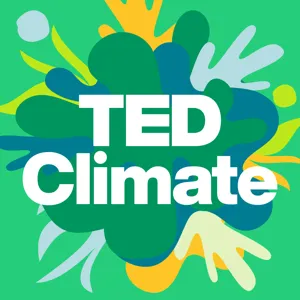Podcast Summary
Technology, Collaboration, and Nature in Tackling the Climate Crisis: Canva and Slack enhance business efficiency, while the Colorado River negotiations underscore collaboration's importance. Trees absorb carbon, and we need more of them to mitigate the climate crisis.
Technology is revolutionizing the way we work and collaborate, while also addressing environmental challenges. Canva allows for flexible presentations at any time, enabling businesses to save time and grow efficiently. Slack serves as a central hub for work communication and automation, enhancing productivity. The Colorado River negotiations highlight the importance of collaboration and compromise in addressing critical environmental issues. Trees, as natural carbon absorbers, are essential in mitigating the climate crisis, and we need to increase our tree coverage significantly. The TED Climate podcast explores these topics, emphasizing the role of technology, collaboration, and nature in tackling the climate crisis.
Trees as carbon vaults and climate change mitigators: Planting native tree species in ecosystems is the most effective approach to maximizing carbon sequestration and ensuring long-term health of the planet
Trees play a crucial role in mitigating climate change by sequestering carbon through the process of photosynthesis. During their lifetimes, trees act as carbon vaults, storing carbon as wood and releasing only a portion of it back into the atmosphere upon decay. However, for trees to effectively help combat climate change, they need to survive for long periods and reproduce quickly. There isn't a single tree species that meets all these criteria, and even if there was, it wouldn't be a sustainable long-term solution due to the complexity of ecosystems. Instead, the most effective approach is to restore ecosystems by planting native tree species, which thrive in their local environments and contribute to better resistance against climate change. This holistic approach to tree planting and ecosystem restoration is essential for maximizing carbon sequestration and ensuring the long-term health of our planet.
Restoring forests could sequester up to 200 billion tons of carbon: Restoring forests is a complex process with potential unintended consequences, but it could sequester significant amounts of carbon and inspire larger-scale efforts to combat climate change. Protecting existing forests is also crucial.
While restoring forests could capture significant amounts of carbon and help combat climate change, it's a complex issue with many challenges. A study led by the Crowther Lab estimated that Earth could support nearly 1.2 trillion trees and potentially sequester 100 to 200 billion tons of carbon. However, the restoration process is complex and uncertain, with potential unintended consequences and the need for long-term protection. Additionally, protecting existing forests is crucial. Restoration isn't a silver bullet solution to climate change, but it's an important step that could provide valuable data and conviction for larger-scale efforts. As Thomas Crowther noted in his TED talk, trees are an essential part of the solution, but they're just one piece of the puzzle.
Urban trees: Natural sponges and air purifiers: Urban trees absorb stormwater, release filtered water, trap pollutants, and purify the air, contributing to the health and well-being of city dwellers.
Urban trees play a crucial role in maintaining the health and well-being of cities and their inhabitants. They act as natural sponges, absorbing stormwater and releasing it back into the atmosphere, preventing mudslides, and filtering out toxins. Trees also help reduce the need for storm drains and water treatment plants, and their porous leaves purify the air by trapping carbon and other pollutants. Historically, the lack of trees in cities like Manhattan during the 1870s led to poor health outcomes, including increased solar radiation absorption and poor sanitation. Modern cities, like Hong Kong, face challenges in incorporating trees due to tall buildings and underground infrastructure, leading to poor air quality and health issues. However, cities like Copenhagen have successfully integrated trees into their urban planning, increasing resilience to pollution and natural disasters, and improving the health and well-being of their citizens. In short, trees are essential to the health and vitality of urban spaces.
Preserving biodiversity and enhancing urban living with trees: Trees protect local flora and fauna, reduce carbon footprint, create eco-friendly habitats, provide oxygen, absorb carbon dioxide, improve mental and emotional well-being, and contribute to reforestation and restoration efforts.
Trees play a crucial role in preserving biodiversity and enhancing urban living. Portland's Forest Park is an excellent example of how natural spaces can protect local flora and fauna. Meanwhile, Singapore's commitment to tree planting and sustainable urban planning demonstrates how cities can reduce their carbon footprint and create eco-friendly habitats. By 2050, over 65% of the world's population is projected to live in cities, making it essential to prioritize green spaces and tree coverage. Trees not only provide oxygen and absorb carbon dioxide but also improve mental and emotional well-being. The TED Ed lesson "The Secret Language of Trees" further explores the hidden connections between trees and their environment. To contribute to reforestation and restoration efforts, consider planting a tree, supporting organizations, or getting involved with initiatives like TED's Countdown.
Collaboration is key to creating high-quality content: Effective collaboration involves a team of experts contributing their unique skills and perspectives to produce well-researched and well-written content.
Effective collaboration is essential in producing high-quality content. In our discussion, we mentioned the involvement of several key individuals in the creation and refinement of two pieces. Alex Gendler and myself provided editorial support, while Edin Girma ensured factual accuracy through fact-checking. We also expressed gratitude to Alex Rosenthal, Garrett Ciello, Michelle Quint, Ben Ben Chang, and Anna Phelan for their contributions. This team effort demonstrates the importance of a collaborative approach in creating well-researched and well-written content. It also highlights the value of having a team of experts who can contribute their unique skills and perspectives to the project. Overall, the success of the pieces can be attributed to the collective efforts of the team, underscoring the importance of collaboration in content creation.






